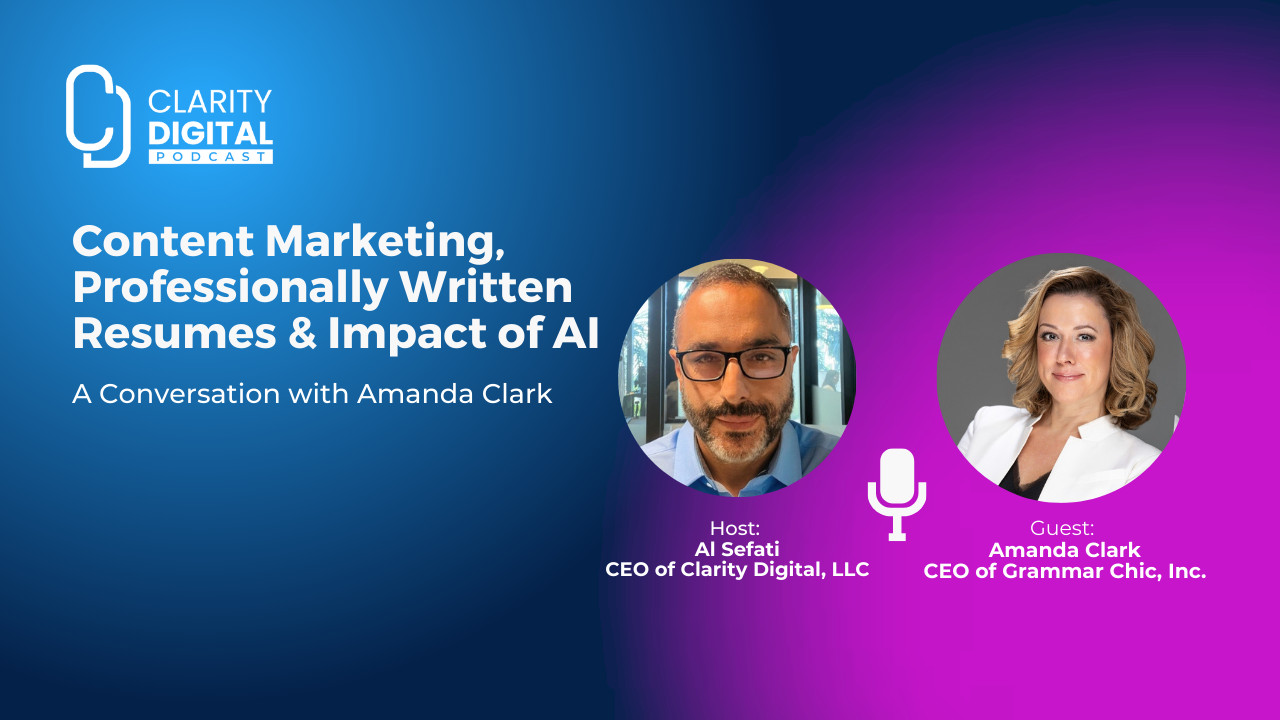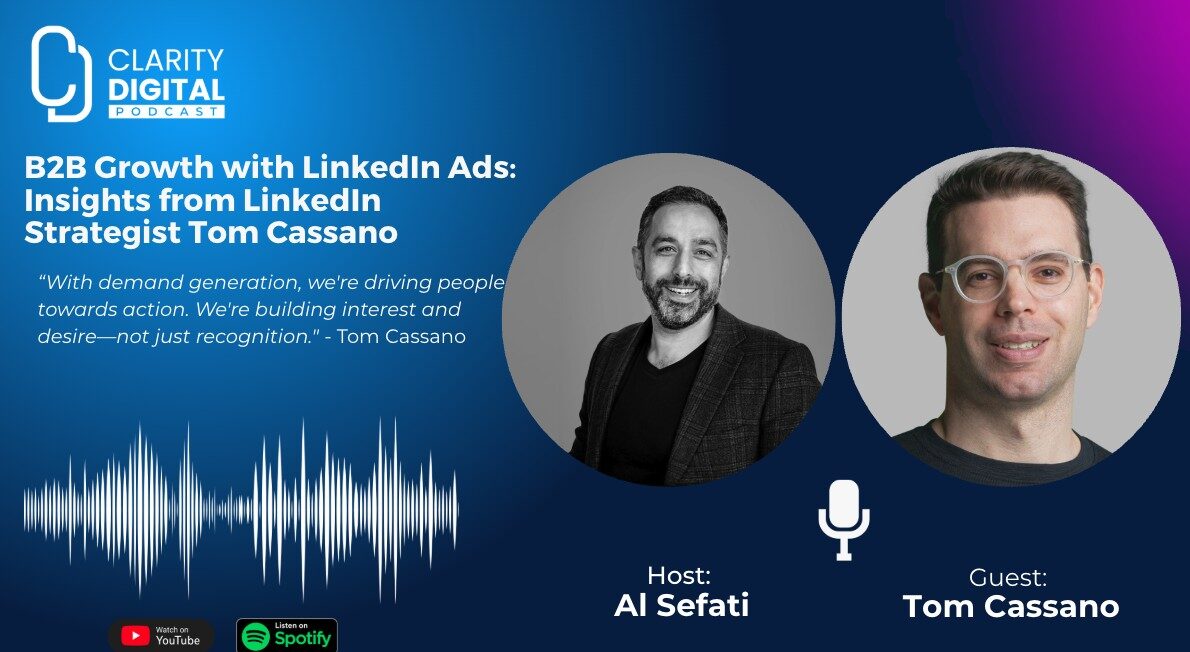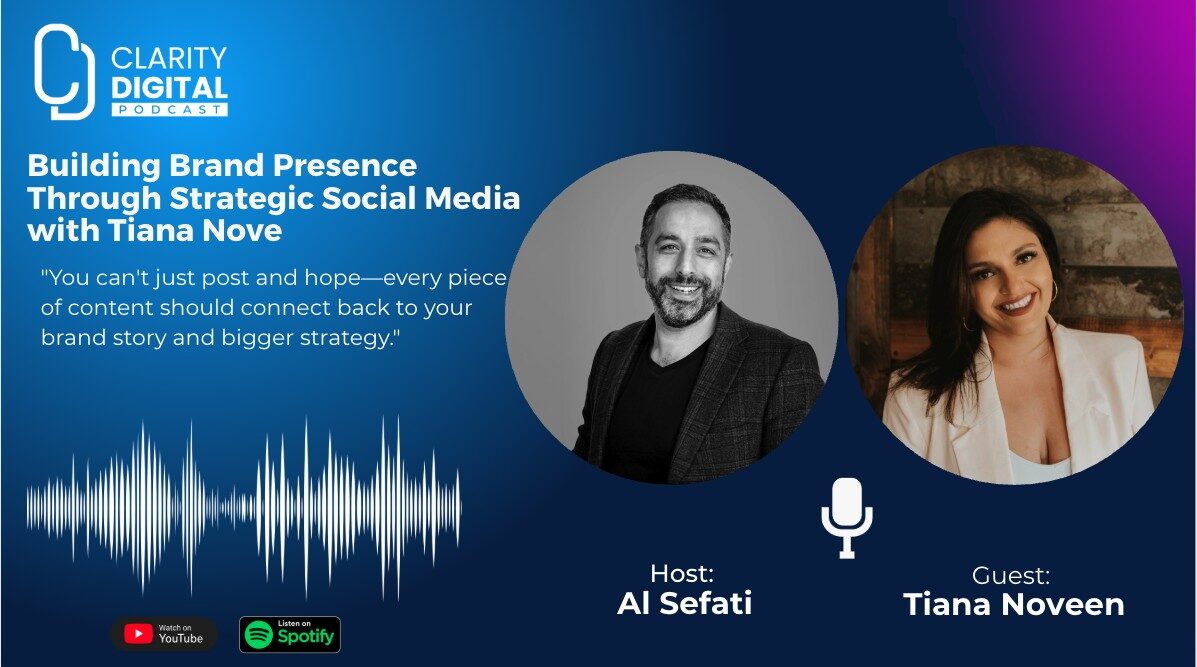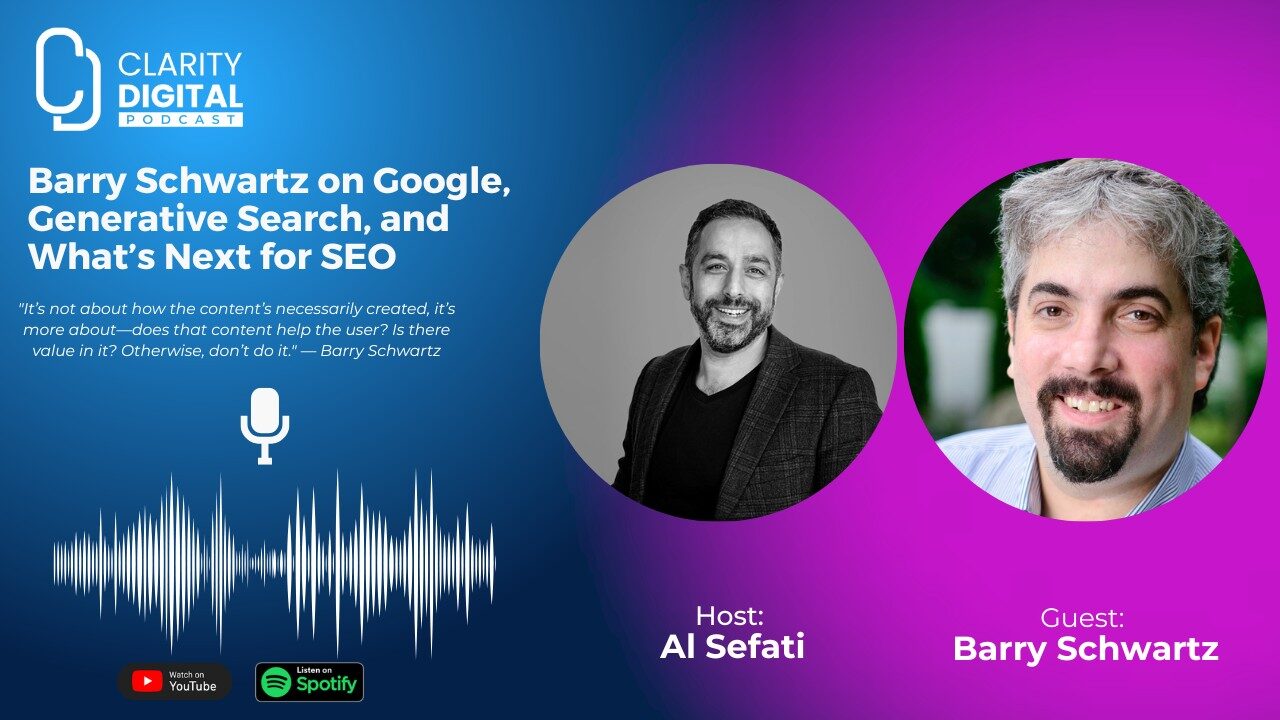A Conversation with Amanda Clark
In the latest episode of the Clarity Digital Podcast, host Al Sefati sits down with Amanda Clark, CEO and founder of Grammar Chic, Inc., to discuss the evolution of content marketing, the growing influence of AI, and how professionals can craft resumes that stand out in today’s competitive job market.
With over many years of experience, Amanda has witnessed firsthand how marketing and professional writing have transformed. In this discussion, she shares valuable insights on the changing landscape of content marketing, the role of AI in writing, and the best practices for job seekers navigating today’s hiring environment.
The Evolution of Content Marketing
Content marketing has come a long way since the early days of SEO. Amanda reflects on how businesses initially underestimated the power of content and social media. When Grammar Chic first started, SEO was still in its infancy, and many marketers were focused on outdated tactics like keyword stuffing and mass-producing low-quality articles to game search engines.
Fast forward to today, and content marketing is far more strategic and audience-driven. Brands are expected to create authentic, valuable, and engaging content that resonates with their target audience. Social media has also evolved, with platforms like Twitter (now X) losing relevance in certain industries, while others, like LinkedIn, continue to grow as a critical space for B2B marketing.
Amanda emphasizes that a one-size-fits-all content strategy no longer works. Instead, brands need to carefully assess where their audience is most active and invest resources in platforms that provide the best return on engagement.
The Importance of Personalization in Content Strategy
Many businesses fall into the trap of spreading themselves too thin across multiple platforms, posting generic content that fails to connect with their audience. Amanda advises businesses to focus on the channels that truly matter and to put effort into personalization and storytelling.
One powerful tool in today’s marketing mix is user-generated content (UGC). Rather than relying solely on company-created content, brands can leverage testimonials, reviews, and customer stories to create more engaging and trustworthy marketing assets. Amanda shares how she identifies her “super fans”—clients who naturally advocate for her business—and encourages them to share their experiences.
According to Amanda, video testimonials have become a highly effective form of UGC. They provide a level of authenticity and credibility that traditional text-based reviews often lack.
AI’s Impact on Content Marketing & Professional Writing
The introduction of AI tools like ChatGPT and Gemini has revolutionized how content is created, but it has also raised ethical concerns. Amanda discusses how AI is a double-edged sword for marketers and writers.
On one hand, AI can be an invaluable tool for brainstorming, outlining, and drafting content. It can help speed up processes that would otherwise take hours, making it easier for writers to generate ideas, structure content, and refine messaging. However, AI-generated content still lacks originality, nuance, and human creativity.
One of the biggest issues with AI-generated content is its predictability. Amanda points out that AI tends to use repetitive phrases and overly formal language, making it easy to spot when content has been generated by a machine. She notes that phrases like “in today’s ever-changing digital landscape” or excessive use of rocket ship emojis are telltale signs of AI-generated writing.
Additionally, plagiarism and data privacy concerns are growing. Many people assume that AI-generated content is entirely original, but AI models pull from a vast dataset that includes existing content across the web. This has led to legal and ethical challenges regarding ownership and copyright infringement.
For companies using AI in their content strategy, Amanda recommends establishing clear guidelines to ensure that AI is used responsibly. Businesses should also be cautious when inputting proprietary or sensitive information into AI platforms, as this data could potentially be accessed or repurposed.
The Role of AI in Resume Writing
AI is also changing the job search process, particularly in resume writing and applicant tracking systems (ATS). Many companies now use AI to screen resumes, which means job seekers must be strategic in how they format and optimize their resumes.
Amanda explains that keyword optimization is crucial for getting past ATS filters. However, simply stuffing a resume with keywords isn’t enough. Job seekers must balance ATS compliance with readability to ensure their resumes still appeal to human recruiters.
One strategy Amanda uses when writing resumes is analyzing job descriptions to identify key terms and skills. She then tailors resumes to match the language and expectations of the employer while maintaining a professional and polished tone.
Another important factor is LinkedIn optimization. Amanda advises professionals to ensure their LinkedIn profiles align with their resumes and include detailed descriptions of accomplishments, skills, and career highlights. She also encourages job seekers to add media elements like portfolios, publications, and testimonials to strengthen their profiles.
How Job Seekers Can Stand Out
In today’s competitive job market, simply having a resume isn’t enough. Amanda shares key tips to help job seekers create strong, compelling resumes that stand out:
- Keep track of accomplishments – Documenting key achievements throughout a career makes it easier to update resumes without struggling to remember past successes.
- Use a professional bio – For entrepreneurs, consultants, and executives, a one-page bio can be a more effective tool than a traditional resume when pitching services or networking.
- Leverage LinkedIn – A well-optimized LinkedIn profile is just as important as a resume, especially for those in marketing, consulting, and creative industries.
- Write a tailored cover letter – Many recruiters prioritize applicants who submit customized cover letters, as it shows initiative and genuine interest in the role.
- Keep resumes updated – Job seekers should regularly update their resumes and LinkedIn profiles, rather than waiting until they need to start applying.
Amanda also stresses the importance of storytelling in job applications. A strong resume should not just list responsibilities, but highlight impact and results. Employers want to see how candidates have contributed to past organizations and how they can bring value to their next role.
Closing Thoughts
As AI continues to shape both content marketing and professional writing, it’s essential to strike a balance between automation and human creativity. While AI can be a powerful tool, authenticity, strategic thinking, and personalization remain the key differentiators in both marketing and job searching.
Amanda’s insights provide valuable takeaways for marketers, business owners, and job seekers alike. Whether it’s crafting compelling content, leveraging AI responsibly, or optimizing a resume for today’s hiring landscape, success lies in adaptability and continuous learning.
For more expert insights, check out Grammar Chic, Inc. at www.grammarchic.net.
And for more conversations on marketing, AI, and career growth, stay tuned to the Clarity Digital Podcast by visiting our website or following our YouTube channel.





